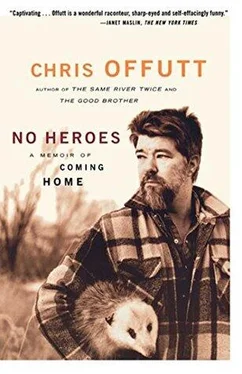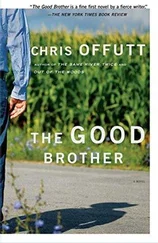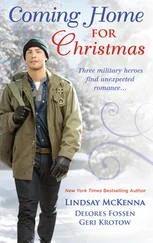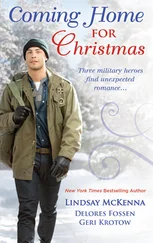“I don’t know. It won’t be the same sober.”
“Damn sure won’t, will it?”
“I was thinking of going to Haldeman if you want a ride.”
He nodded and we drove east into the hills so steep you’d skin your nose climbing out. With Harley in the car, Haldeman seemed to transform to its former glory. My mind was thankfully free of memory; I only felt our shared past.
“Stand on it, Chris,” Harley said. “Let’s see what this rig is made of.”
I mashed my foot to the gas pedal and held it there. The Malibu jumped forward as if kicked by a giant. Harley was laughing. I forced my attention on driving instead of the land flashing past like speeded-up film. The needle on the speedometer topped a hundred and hovered in the redline with nowhere left to go, but I could hear the big engine continuing to strain. In Haldeman, I slowed for a couple of turns and turned into his hollow. Harley stopped me.
“Best not come up the creek,” he said. “They don’t know this car.”
“Reckon they’ll shoot?”
“Can’t tell, Chris. If I saw this car I might shoot you for it. It’ll flat fly.”
He left the car and leaned in the open door.
“One thing, Chris. When you go back, you know, into all that out there. You’re still yet a Haldeman boy.”
“I know it.”
“Keep your ass wiped.”
I aimed the Malibu toward town, feeling like a pilgrim in my own country. Haldeman had been abandoned in the name of progress. The feds shut the post office and retired the zip code. The grade school was closed. The only store sat vacant. The roads were blacktop and town water replaced the wells. The bootlegger was gone, the poolroom burnt down, and the poker game moved elsewhere. The steel train rails were peeled from the earth and the cross-ties hauled away. The rail bed was ideal for trailers, which stretched through the hills like cattle cars tethered to the land. Nothing was left of Haldeman except geography.
Time had mown my hometown down.
Each day we taped, Arthur talked for several hours. The sun faded behind the hills and the room became dark. I didn’t want to interrupt by suggesting a light. Eventually we sat in utter darkness. The kids were asleep, the house quiet. Arthur wanted to take a drive. We went outside to my car and he stood on the driver’s side, befuddled and confused.
“Tell me,” he said, “why is this wheel here?”
Relating his story had returned him so firmly to Europe that he expected the steering wheel to be on the opposite side of the car.
“It’s okay,” I said. “We’re in America. It’s okay.”
“I hate okay,” he said. “In this country, everything is okay. I talk to my daughter, she says the baby is okay. Her husband is okay. The new job is okay. Everything is okay but I know nothing. In Europe okay was the first word I learned. They said, do you speak English, and I said, okay. Then I learned fuck you. The next time somebody says something is okay, I’m going to say fuck you.”
“Okay.”
“Fuck you.”
Arthur laughed for a long time.
My former teacher, Frank Conroy, called to offer a visiting position at The University of Iowa Writers’ Workshop. I accepted without hesitation. Rita was ecstatic at the prospect of a return to the only place she’d ever liked living. Eleven years ago, broke and desperate, I’d left Kentucky to attend graduate school in Iowa. Now Iowa was again bailing me out of the hills like my own private French Foreign Legion.
We sold our house within a week, accepting earnest money pending closure. The realtor assured us that the buyer’s loan was in the bag. I drove a car held together by duct tape to Iowa City and found a small house in the neighborhood Rita preferred. An Iowa bank granted a loan without my needing to lie, and I quickly closed on the house. Two weeks later, the sale of the house in Kentucky fell through. I suddenly found myself unemployed with no savings, and a quarter of a million dollars in debt. For the next two weeks, I didn’t sleep and Rita didn’t eat. We could live on credit cards until my Iowa job started, but the salary wouldn’t cover two mortgages. Worse, we’d missed the brief window of house-selling in Morehead. The only people who move to Rowan County with intent to purchase a home are professors or doctors, and real estate deals occur for a single month. That month was long past. Our house had sat vacant for a year before we bought it. Now we faced the same problem.
The realtor blamed everything on the buyer, Dale Greer, a man I’d vaguely known years before. He’d had an illustrious career in television before settling in Morehead as a professor. I called him and asked if I could come by and talk. He grunted yes and I drove to his house. He invited me in and we eyed each other warily like two tomcats who might be enemies. I breathed long and deep to ease my way out of the tension.
“Look,” I said, “I need to sell my house. I’m in a bad jam. I already bought one in Iowa and now I owe two banks a fortune. When the sale here fell through I had to get what they call a bridge loan and the interest is killing me. Do you want my house or what?”
“Yes,” he said. “I want it.”
“So what’s the problem?”
“You tell me, Chris.”
“I don’t know, Dale. That’s why I’m here. The realtor tells me you’re uncooperative, that your loan’s no good, that nobody can get along with you.”
“That’s a laugh. The realtor said you were an asshole.”
We stared at each other without speaking. Behind him I could see out the window into a neighbor’s yard that appeared vaguely familiar. I recognized the furniture but not the view.
“That’s Mary Alice Jayne’s house,” he said. “I saw you over there before she died. Your kids, too.”
“She was a good lady.”
“My wife looked in on her once a week.”
“The whole county took care of her.”
Again we stared at each other. We’d shifted from cats to a couple of dogs trying to get along.
“I should have called you sooner,” I said.
“The realtor told me not to talk to you.”
“Same here, Dale. I thought maybe you were trying to mess with me on the price.”
“I can see how you might think that way, but it’s not true.”
“That’s why we pay a realtor’s fee, right? So they’ll lie to us about the other guy.”
“It doesn’t cost them a thing, either.”
“No, Dale, we’re the ones holding the bag. You want the house, right?”
“I love that house. So does my wife. She’s a painter and it’s perfect. It’s the second marriage for both of us. We’re trying to start over. She’s from the country and it’s a beautiful spot.”
“There’s some nice woods, Dale. I’ve made trails in them.”
“I know. The realtor showed them to us. My wife is madder about this than I am.”
“Mine won’t even talk to me.”
“Neither will mine.”
“What’s the holdup on your end?” I said.
“My damn car. I can’t sell it. I need the money for the downpayment and what I owe on the car makes me have too high a debt ratio for the loan. It’s through the V.A. so I only have to give a small downpayment, but they’re sticklers about everything. I’m at the end of my rope. We’ve run these numbers ten ways from Sunday. It all comes down to the car. Now I’m screwed.”
“Me, too, Dale. The realtor didn’t show the house to anyone but you, and now the buying period is over.”
“This place is a rental. We have to be out by the end of the month. Three weeks.”
“We can work this out, Dale. It’s just you and me right now. No realtors. I got an idea.”
Читать дальше












